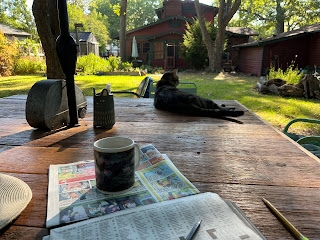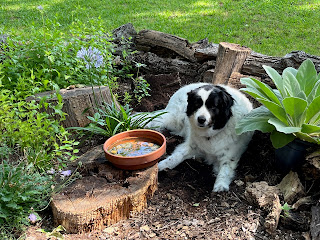Note: This post was actually written about a week ago, but life got in the way, the weather's since been up and down, and we're at the beginning of another heat wave. The musings, however, still hold.
 |
| Late August morning in McKinney; First clouds in weeks! |
The Beloved Spouse and I were enjoying the cool, breezy morning--after weeks of blistering temperatures with only one, short, previous break. This is beginning to look like a harbinger of Fall, but we're not celebrating extended good fortune quite yet. Still, even a short-lived respite is welcome, and recognizing good fortune often results in good conversation.
As often happens among the philosophically inclined, we were discussing the conditions that have created the current socio-political situation: climate change, energy consumption, consumption in general, the kind of materialism that convinces people that they need more and more stuff (instead of the kind of materialism that focuses on what exists rather than what people imagine might be out there), greed, The Future. In other words, Life, the Universe, and Everything. As we often do.
After we had mused about what we could do to ameliorate things (acquire an electric car, increase our solar production/battery capabilities), I wondered out loud about how much of what we already do makes even a dent in the overall condition of the planet: cut unnecessary consumption of consumer goods rather drastically, eliminate food waste, conserve power, reduce reliance on natural gas, minimize water use, eliminate single-use plastics, rely as much as possible on locally sourced food (sustainably grown and humanely raised), minimize car use--all of which we're already pretty good at.
But to what end? If as few people actually make these efforts as seems to be the case, are we really accomplishing anything?
We also live in an area of the country that's experiencing monstrous growth with the accompanying environmental degradation, increased pollution, massive addition of concrete and other problematic infrastructure materials, and demand for (and ultimate shortage of) water resources. The influx of population is bringing with it not only more people, more jobs, increasing property values, and a larger tax base (which are all considered Good Things in Texas), but is also exacerbating all of the problems conscientious people are trying to deal with.
A few signs of hope occasionally appear, like the increasing presence of local farms practicing regenerative agriculture (even as land gets snatched up by developers), urban farmlets cropping (sorry) up in South Dallas's food desert, cooperative enterprises that involve farmers, artisans, restaurateurs, food purveyors, and other socially and environmentally responsible entrepreneurs. But can they keep up with the "progress as growth" ethos built into the kind of consumer capitalism that dominates the current economy?
Another hopeful sign is the increasing number of "slow" movements sneaking into the existing economic forecast. Backlashes against destructive consumerism, especially in food and fashion, are appearing in the news, online, and in shelter magazines. The permaculture movement, most visibly evident in Australia, but catching on in Great Britain, the US, and Canada fairly conspicuously, is becoming a "thing." I've become an avid reader of Tom Hodgkinson's The Idler, which advocates slowing down and smelling flowers, but also a slower, more engaged, less frenetic economy. I only subscribed after it became available digitally because of my problematic relationship with print publications. (Digital subscriptions are also less expensive.) It is, however, highly entertaining, and often quite instructive.
Oddly enough, given my technologically skeptical bent, social media platforms like Pinterest and YouTube are helpful in promulgating practices that lead to slowing down and less active forms of consumption. For example, TBS and I have become followers of a few travel vlogs that allow us to enjoy activities out of our financial reach (such as sailing, or wandering around Scotland, or boating on the British canal system, or living in a Japanese satoyama and restoring a rice farm) vicariously. Every day we can learn something about the latest astrophysics news, watch Italian nonnas make pasta, or clever chefs show us how to make dishes from recipes published in the New York Times food section. Pinterest allows me to collect and curate inspiring photos and articles like those I used to cut out of the shelter magazines I subscribed to and save in notebooks. Now I can do much more with the interesting ideas I come across. At least until the EMP comes and fries the Cloud.
And so, while we still have pipe dreams about buying an electric truck and pulling an electric caravan, it's more likely that we'll keep plugging away at doing what we can to lower our planetary impact. I may not be able to maintain a completely waste-free household (the kind of effort that frequently appears in the newspaper and magazine articles I consume), over the last decade we have managed to reduce our trash output to a single green bin per month (stuff headed for the tip), and our recycle bin goes out every month or so. New clothing purchases are primarily confined to tennis shoes (TBS's avocation requires properly supportive foot ware) and underwear, neither of which are suitably acquired at charity shops. I'm also hoping to solve some of our energy-consumption challenges by creating insulated portieres to help us isolate single rooms when we need an air conditioner to escape the heat, or a heated room to withstand the cold. We're currently recycling old woven serapes, but they're not as efficient as they could be. Over the years, however, I've collected large bins of fabrics--from worn clothing, bed linens, remnants from old projects, and thrift-store finds, all of which will allow me to make use of my antique-looking sewing machine or (if I'm feeling especially frugal) my grandmother's treadle machine, on which I learned to sew in the first place.
In fact, ruminating on the conditions in which my grandmother grew up (isolated Nevada ranch with no running water, indoor plumbing, nor electricity), and remembering the little two-room cottage with a single water spigot in the kitchen and outdoor toilet where my family spent a year in Japan, provides a reality check when I feel a bit picked on by the cosmos.
All of this navel gazing has come about in part because of the 100-degree (F) exterior heat that's characterized the last two months, and that seeps into a wood-frame house with brick cladding and little insulation (and not much we can really do about it). Upgrading heating and cooling sources, and otherwise improving a century-old house built to withstand nineteenth-century temperatures, requires more money (and in some cases, physical effort) than we can expend. So we make do, as inventively as we can, because we chose this house, and love it enough to keep living in it.
We are deeply aware that there are unimaginable numbers of people in this world, and even in this very state, who are far worse off than we are. And if our meager efforts to make a difference aren't any where near enough, at least they're not nothing.
And maybe, at least for now, that has to be enough.





.jpg)
